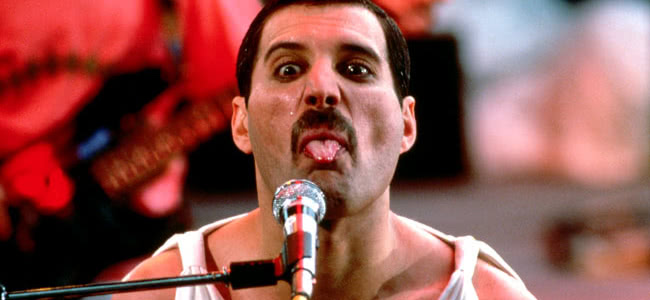Late great Queen frontman Freddie Mercury has become the internet’s symbol for what a certain faction of militant music lovers like to call ‘real music’.
You’ve no doubt seen memes offering to trade God Mercury in return for Justin Bieber or comparing the lyrics of ‘Bohemian Rhapsody’ to a supposedly lesser song by Ke$ha or Beyonce.
Whilst this kind of rock elitism elicits little more than an eye-roll amongst the Tone Deaf staff, we can certainly get behind praising Freddie Mercury as one of the most talented musicians of all time.
Legend has it that the Queen frontman had an immense four-octave vocal range, could rival the singing power of most opera stars, and was pretty much the greatest frontman of all time.
Whilst that’s ultimately a subjective argument no doubt going on at a pub somewhere in the world as we speak, there is actual scientific proof Mercury was the greatest singer in rock.
As Consequence of Sound reported, a group of European researchers published a study in the journal Logopedics Phoniatrics Vocology which details how remarkable Mercury’s voice was.
As part of their report, researchers got singer Daniel Zangger-Borch to imitate Mercury’s vocals, reportedly filming his larynx at 4,000 frames per second to observe how Mercury achieved his high-flying vocal acrobatics.
Love Music?
Get your daily dose of metal, rock, indie, pop, and everything else in between.
According to the paper, Mercury likely used a singing technique called ‘subharmonics’, most notably used by throat singers, whereby a person’s ventricular folds vibrate with the vocal folds.
Mercury’s vocal chords are also unique in that they moved faster than your average vocal chords, fluctuating at 7.04Hz. To put this in context, your typical vocal vibrato sits somewhere between 5.4Hz and 6.9Hz.
In fact, as CoS note, a perfect sine wave for vibrato has a value of 1, which is what Pavarotti averaged. Mercury, meanwhile, was about 0.57, meaning there was stuff going on in his vocal chords that Pavarotti himself couldn’t manage.
So does that make Mercury the greatest frontman in rock history? Better than Jagger or Axl or whoever else you’d like to throw out there? Still up for debate. But there’s definitely a scientific case to be made that he was the greatest singer.

































